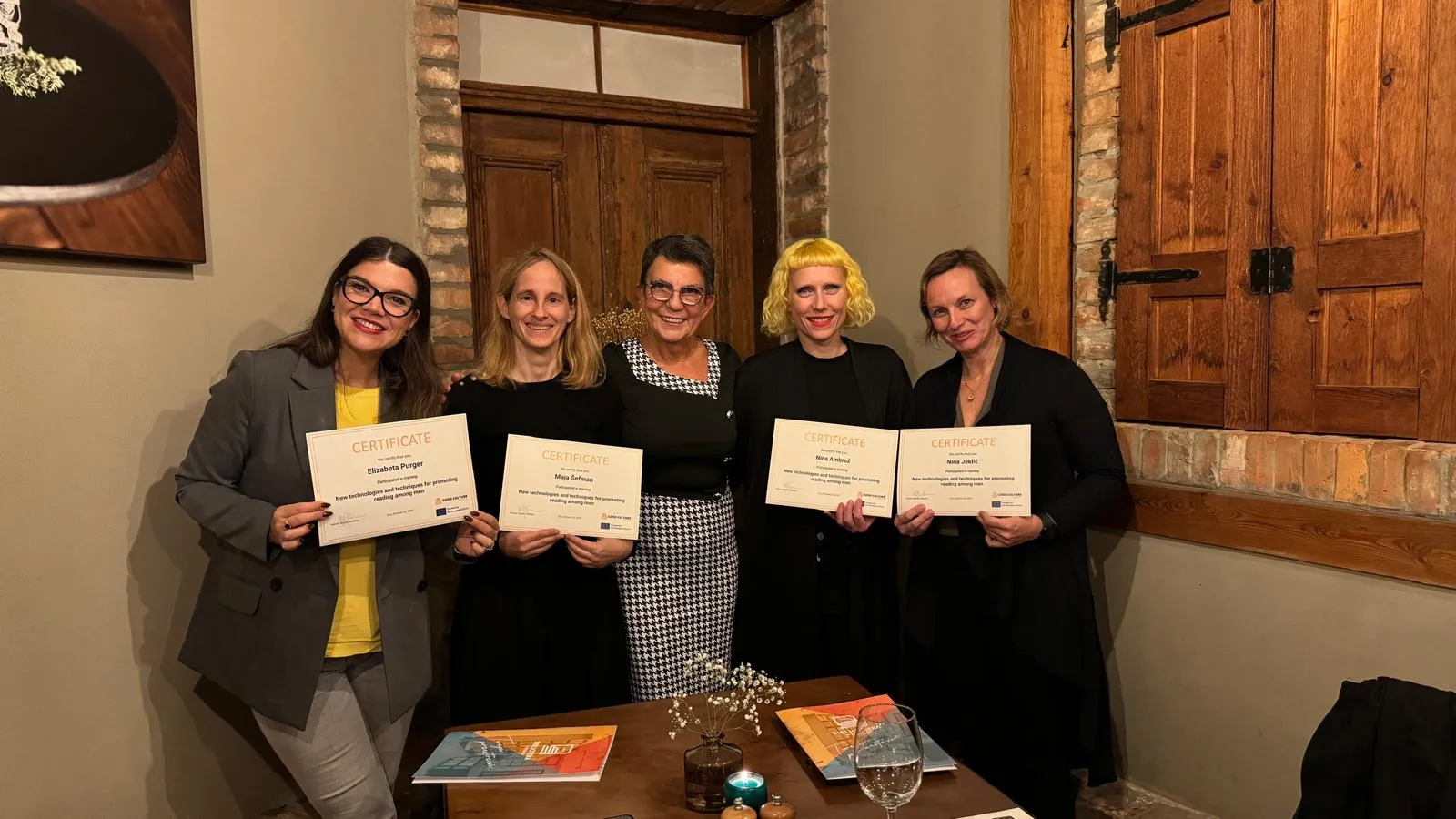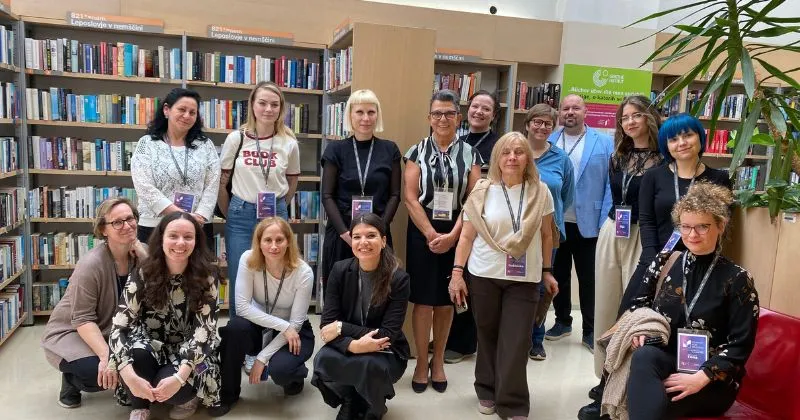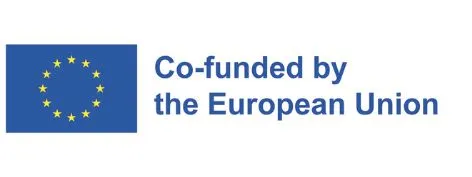Climate for Reading, Part 1: Engaging Male (Non)Readers

Image 1: Logo of the ''Climate for Reading'' project.
This article presents key insights from the first international meeting of the Climate for Reading project, focusing on strategies for engaging male (non)readers in libraries. The Ljubljana City Library (LCL) is participating in the Erasmus+ KA210-ADU project Climate for Reading, a small-scale partnership focused on general adult education. The project’s main goals are to exchange good practices and enhance the competencies of library staff in engaging adult readers – especially those who read little or not at all.
Partners in the project include:
- Municipal Public Library in Żory (Miejska Biblioteka Publiczna w Żorach), Project coordinator, Poland,
- Innlandet County Library (Innlandet Fylkesbibliotek), Norway,
- City and University Library of Osijek (Gradska i sveučilišna knjižnica Osijek),Croatia,
- Ljubljana City Library (Mestna knjižnica Ljubljana), Slovenia.
The project was first submitted in March 2023, but following feedback from evaluators, we revised and successfully resubmitted the application in October 2023. The project officially began in autumn 2024 and includes four international meetings: in Poland (October 2024), Slovenia (March 2025), Norway (June 2025), and Croatia (September 2025). Each meeting focuses on a specific target group.

Image 2: The Slovenian team with the director of the Żory Library and certificates.
Sustainable Travel & Inspiration from the Host Library
In line with our commitment to green travel practices, our team chose to make the journey of over 750 km from Ljubljana to Żory by car, consciously avoiding air travel. We opted for a route through Austria and the Czech Republic, sharing driving duties and enjoying the changing landscapes along the way. While the trip included some expected traffic delays near major cities like Vienna and Brno, the experience itself fostered team bonding and allowed us to reflect on sustainable travel as a meaningful part of international cooperation.
Once in Poland, we were warmly welcomed by our hosts at the Municipal Public Library in Żory, where the library’s space and atmosphere truly impressed us.. The library is housed in a beautifully restored former steam mill, where the architectural renovation blends industrial heritage with Scandinavian-inspired design. The open, light-filled spaces, natural materials, and thoughtful design choices created an inviting and functional environment that felt both modern and deeply rooted in local history. It was a powerful reminder of how libraries can physically embody the values they promote – accessibility, creativity, and community.
Throughout our stay, we maintained regular communication with our colleagues in Slovenia. We shared insights, impressions, and photos via our internal communication platform, ensuring that the whole team could follow our experiences in real time. Updates were also shared with the public on LinkedIn, Facebook, Instagram, and TikTok, sparking engagement from library users and partners who appreciated being included in our Erasmus+ journey. This ongoing exchange helped us bridge the physical distance and reinforced the idea that international mobility projects benefit not only the participants but the entire library community.
Focus on Male Readers: First Meeting in Żory, Poland
The first project meeting took place from October 23–25, 2024, in Żory, Poland, with four members from the LCL working group attending. The hosts chose to focus on male non-users as a key target group and invited participants to share best practices in services for men. We toured the impressive Żory Public Library. Spread across four floors, the library features a reading room, AV and VR gaming zones, a teen space with board games, a colorful children's department, a maker lab, and a rooftop terrace awaiting development into a café. After exploring the library and the city, including a charming hunt for the symbolic fire mascot Żorek, we concluded the day with the workshop Reading is the Key to Democracy. During this session, we explored the essential role of librarians in fostering reading literacy and empowering individuals. The workshop reinforced our shared belief that librarians not only encourage reading but also nurture critical thinking—an indispensable foundation for active participation in democratic society. On the second day, we visited Opole, known as Poland’s music capital, where we explored the city’s beautifully designed public library and its Filia 4 branch, both deeply engaged with the local community through workshops, travel storytelling events, and cultural projects. We wrapped up the day with a tour of Opole’s key landmarks, including its amphitheater and music museum, and received a book that celebrates traditional folk art.

Image 3: The Library in Żory, following Scandinavian design principles.
A key element of the meeting in Żory was a six-hour workshop titled New Technologies and Techniques to Promote Reading Among Men, led by Marcin Skrabka. This hands-on and thought-provoking session explored how libraries can better attract and engage male audiences—especially those who are occasional or non-readers.
The workshop began with some eye-opening observations about gender-based differences in library use—such as the fact that men feel more comfortable in slightly cooler environments (2–3°C lower), which can subtly affect their sense of belonging in library spaces.
Participants were introduced to a wide range of practical, often low-cost strategies, including:
Library space adaptations like comfortable and informal reading corners designed with male habits and aesthetics in mind.
- A “men’s section” modeled after retail spaces, where content such as books, magazines, music, and films is curated based on male interests – complemented by physical objects or design elements that reflect popular themes.
- One example included signage and layout from a Czech library, where simple yet effective shelf organization—enhanced with visual cues like pictograms (similar to those on Image 4)—helped create an inviting space specifically for men.
Family-friendly events, particularly Saturday father-and-child mornings, where children can join creative workshops while fathers participate in activities like table football, ping pong, video games, or DIY sessions (e.g., making a gift for their partner). These sessions are designed to attract men through playful or practical engagement, indirectly encouraging more time spent in the library.
- Promotion of digital services, with an emphasis on hands-on testing. Librarians were encouraged to offer trial access to e-readers, audiobooks, and digital platforms, recognizing that many men enjoy experimenting with tech and "testing" new formats. Participants discussed promoting this as a “trial zone” concept—where men can casually test devices without pressure. This could include banners or prompts like “Try an e-reader today – free test!”
- Targeted promotion of existing materials like newspapers, men’s magazines, and digital content that many people don’t even know are available in libraries. Many library users are unaware that they can borrow or browse such materials—framing them as “discover & test” items could increase appeal for tech-savvy or curious male audiences.
The workshop sparked lively discussions among participants, who shared challenges and strategies from their home libraries. One particularly impactful idea was the “test zone” – an area where visitors can casually try out digital content or browse curated selections without pressure. The Slovenian team highlighted that some of these ideas could be implemented with minor adaptations at the Ljubljana City Library, particularly the promotion of existing content and the creation of informal tech corners.

Image 4: Recommendation by Marcin Skrabka on how to organize shelves for men.
Participants also discussed indirect promotion strategies, such as encouraging female patrons to inform their male friends, partners, or relatives about these resources. Printed leaflets could be handed out or strategically placed to reach this secondary audience.
Reflections and Next Steps
The Slovenian team found the workshop both inspiring and practical, as it offered concrete, low-cost, and easily adaptable solutions for attracting more male users – especially those who do not identify as regular readers. Some of the suggestions, such as setting up tech-friendly corners, and expanding promotional efforts, are being reviewed for potential rollout in a pilot phase at the Ljubljana City Library.
The project continued in March 2025 with the second international meeting, hosted by the Ljubljana City Library between 25 and 27 March. This time, the focus was on working with migrants – an increasingly important target group in adult education and library services. While a detailed report from the Ljubljana meeting will follow in a separate article, the event offered another valuable opportunity for exchanging practices and deepening the partnership.

Image 5: Partners at the Ljubljana City Library, March 2025.
So far, Climate for Reading has proven to be a valuable opportunity to grow, learn, and connect. By sharing insights and testing innovative approaches, libraries across Europe can strengthen their ability to engage adult readers – one target group at a time. Projects that include several international meetings also provide an excellent platform for networking and partnership-building. The personal connections and trust developed through such collaborations often lead to new ideas and future joint initiatives – making the impact of the project even more long-lasting.
If you're a librarian considering joining an Erasmus+ project – go for it. It's an inspiring, rewarding experience that can truly transform your library practice.

Maja Šefman works as coordinator project at the Ljubljana City Library in the Center for international cooperation. She coordinates Erasmus+ mobility, conducts various bibliopedagogical activities and training for Slovenian librarians on animation and the preparation of interactive content, participates and reading promotion projects.




